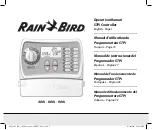
6
16.00
20.00
31.38
3.50
3.50
3.50
2.06
1.25
1.50
(C) WATER QUALITY REQUIREMENTS
(D) INSTALLATION
The unit should only be operated with water that meets the following minimum criteria:
Turbidity/Suspended Solids:
Ideally less than 1 NTU (Nephelometric Turbidity Unit). A 5 micron sediment filter or better must be installed
before the UV system at all times. If the feed water has fine sediment, a finer pre-filter (1 micron or smaller) may be used. If the water has very
high turbidity, a back-washable multi-media filter is recommended along with a cartridge type filter.
Hardness:
Less than 7 GPG (120 mg/L). Hard water causes scale build-up on the quartz sleeves thereby reducing the UV transmittance in the
water and in turn reduced performance. The UV system will work with hard water for a short time after which the scale build-up on the quartz
dome will cause reduced disinfection performance (unsafe condition). It is therefore recommended that, for hard water, a water softener should
be installed prior to the UV system.
Iron & Manganese:
Iron less than 0.3 PPM (mg/L) and Manganese less than 0.05 mg/L is desirable. At higher concentrations, a suitable water
conditioner (e.g. an Iron Filter or Greensand filter) should be installed prior to the UV system to prevent iron build-up on the quartz dome that
can cause insufficient disinfection.
Tannins and Colour:
Water with tannins or colour has low UV transmissivity that reduces UV system performance. The UV system will not work
if the water has tannins or colour. A tannin-removal system should be installed for proper disinfection.
INSTALLATION NOTES AND CAUTIONS:
The Aqua Flo AQUV Water Disinfection System is designed for installation on the cold water line only at the point of entry (POE). For installation
in the Province of Quebec, install the AQUV-8 to serve a max of 1-2 outlets and the AQUV-12 to serve a max of 2-3 outlets only, but not
serving majority of the premises. Canature is not liable for any non-compliance with local requirements.
The system requires a constant power supply of 110V AC.
It is strongly recommended to have a dedicated electrical circuit for the UV system. A CSA or equivalent certified surge protector must be installed
to protect the ballast from electrical surges. We recommend surge protector rated for a clamping voltage of less than 400 Volts, response time of
less than one nanosecond, and energy absorption of at least 600 Joules.
The AQUV-20, AQUV-12 & AQUV-8 systems have been designed for maximum water flow rates of 20 US GPM (75 liters per minute), 12 US GPM
(45 liters per minute) and 8 US GPM (30 liters per minute) respectively. If higher flow rates exist occasionally, it is recommended that a flow
restricter be installed at the inlet port (8 US GPM for AQUV-8, 12 US GPM for AQUV-12 and 20 US GPM for AQUV-20).
The system should be installed indoors in a protected area where the temperature does not fall below 4°C (40°F).
For optimum performance, the system should be wall-mounted in a vertical position with the lamp connector at the top. The water inlet is at the
bottom and the outlet at the top, as shown in Fig. 1. The system can be installed horizontally but cannot be drained fully in that position and
there is a higher probability of breaking the quartz dome during service. When installing one of these systems horizontally, the outlet should
point upward to allow air to escape the UV chamber.
It is highly recommended to install bypass piping with a shut-off valve around the unit. This way you can still have water in case you need to
remove the UV unit for service.
Provide a minimum clearance of 3 feet above the unit for lamp replacement.
Use only Teflon tape for all connections. Do not use any other sealant on the threads.
DIMENSIONS
CAUTION!
** Install a pressure regulator and water hammer
arrestor if pressure exceeds maximum rating of
100 psi at any time. Note: If daytime pressure is
over 80 psi, night time pressure may exceed
maximum pressure rating.
NOTICE
Check with your local public works department
for applicable local plumbing and sanitation
codes. Follow local codes if they differ from
the standards used in this manual. Otherwise,
carefully follow the instructions in this manual.
Canature is not liable for any non-compliance
with local requirements


































